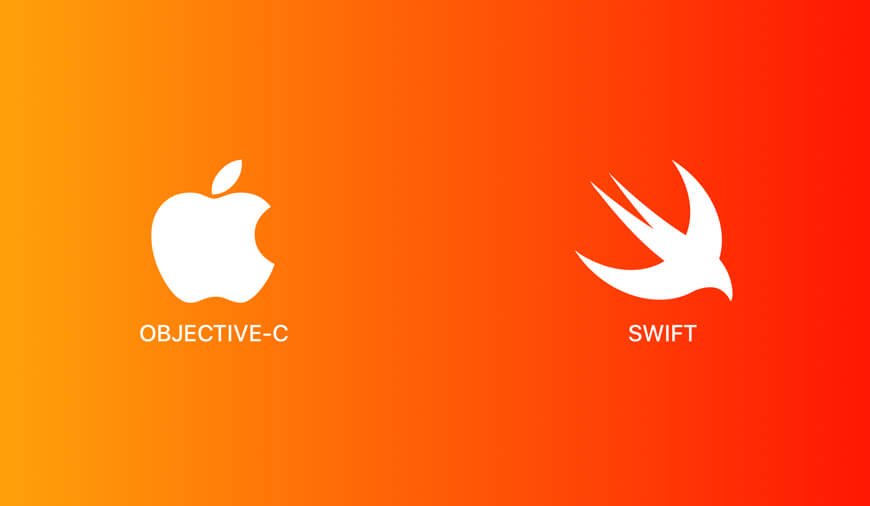Created by Apple and for Apple, Swift is the most rapidly expanding programming language presently. As an alternative to the well-known Objective-C, Swift offers a vast pool of advantages propelling it to the leadership positions in iOS development. The most important of them are listed here.:
Swift is an open source technology and has a strong development community \sit is faster, safer and easier to read and write
Swift provides improved memory management, and it supports dynamic libraries
But before we delve right into the details, watch this video from Apple WWDC 2014 were Swift programming language was presented.
Are you persuaded that Objective-C is a thing of the past and Swift is a thing of the future? We bet you are, but let’s take a closer look at Swift so you can see its difference with Objective-C and understand why it triumphs in the battle of Objective-C vs Swift. And now let’s take a closer look at reasons why you should use Swift for your next iOS programming project. Looking for Hire iOS Developers for your business needs.
Swift is faster
Modern technologies require great speed of performance, and Swift is perfectly covering this need. According to multiple testing, it offers approximately the same performance as C++ for the FFT and Mandelbrot algorithms. It has been also discovered back in 2015 that Xcode 6.3 beta has enhanced the performance of the GEMM algorithm.
Taking into view that Swift is still a new programming language, more and more innovations are going to be given soon. The reason why everyone is talking about future of this technology is simple fact that Swift is rapidly developing language. It’s potential is evident, but Objective-C exhibits worse results.
Swift is safer
Remember the nil pointer variables (uninitialized) in Objective-C changing the expression to no-operation and resulting to app crashes? When you use Swift, you won’t have to worry about this problem. It was created with safety in mind and produces a compiler error, every time you write a poor code. This means all the bugs can be solved at development stage without evaluating the full code afterward. No nasty shocks for customers.
Swift is easier to read and write
One of the reasons why Swift is becoming so ubiquitous is the concise syntax of this programming language. This truth makes code easier both to read and write. On the other hand, Objective-C requires several symbols, semicolons to end lines, parenthesis enclosing conditional expressions inside “if” or “else” statements, etc. Swift does not have any of those. Instead, it utilizes comma-separated list of arguments within parenthesis.
Moreover, implementing any option is Swift needs writing less code strings than on Objective-C language, allowing to avoid additional mistakes, which makes the code cleaner. As a result, developers require fewer hours to complete the assignment comparing to Objective-C.
Resembling natural English, Swift is more understandable for hackers, employing Java, JavaScript, Python, C#, and C++. They can readily incorporate portions of code written in Swift to the existing tool chains you have.
Swift has better memory management
One of the Objective-C difficulties is ARC (Automatic Reference Counting), that is supported within the Cocoa API and object-oriented programs. However, the code is not available for procedural C programs and such APIs as Core Graphics. That leads to the large leaks of memory.
Swift has solved this problem by making ARK complete with the procedural and object-oriented code pathways.Instead of managing memory within an app, coders may now concentrate on the logic and functionality of the app.
Swift supports dynamic libraries
As we discussed above, Swift is rather rapid programming language, but it also allows you to upgrade your apps as soon as the new Swift version arrives. That is feasible thanks to the employment of dynamic libraries, launched concurrently with iOS 8. Previously, the static libraries upgrades were handled along with such important changes like the new iOS version.
Dynamic libraries for their part, allow attaching portions of code directly to the app. This feature helps to maintain your project up-to-date, decreases the initial size of the program, speeds up a load of external libraries and minimizes the time needed to load new content.
Implementing dynamic libraries into Swift is another example of how Apple is focusing on making iOS ecosystem more responsive and giving its users the extended performance.
Swift is an open source project
As an open source project, Swift presents additional advantages to its users and one of them is eliminating name clashes that were prevalent in Objective-C.
Another attractive point of Swift is enormous development community, ready to expand iOS development language. Apple managed to deliver the finest customer experience to developers, who use Swift as the main language for iOS development, by giving the option to influence its future.
Our specialists have collected excellent Swift suggestions in an article. So in case you want to know more about this programming language, just go and check it out.
And what about Objective-C?
Objective-C was a widely-used programming language before 2014 when Swift was debuted. Sad, but true, presently it is going nowhere, and professionals anticipate it would not receive any important improvements. The explanation is simple: Swift language already has all solutions that Objective-C has. Plus, numerous innovations that Objective-C lacks. Though Objective-C might take some of the Swifts’ new features, it would never be that edge cutting.
Another problem Objective-C has is the quality of its security. As noted, Swift is regarded significantly safer. And since data privacy is a number one issue most users have, developers cannot neglect that too.
On top of that, unlike with Swift, it’s impossible to design an app interactively with Objective-C. This is a big disadvantage for every software engineer and it might influence the development process pretty negatively.
Since Apple released Xcode 6.3, resolving numerous bothersome problems from the Apple Bug Report utility, there are no prospects that Objective-C can chase after Swift.
Also read: WordPress Developer Skills 2022

